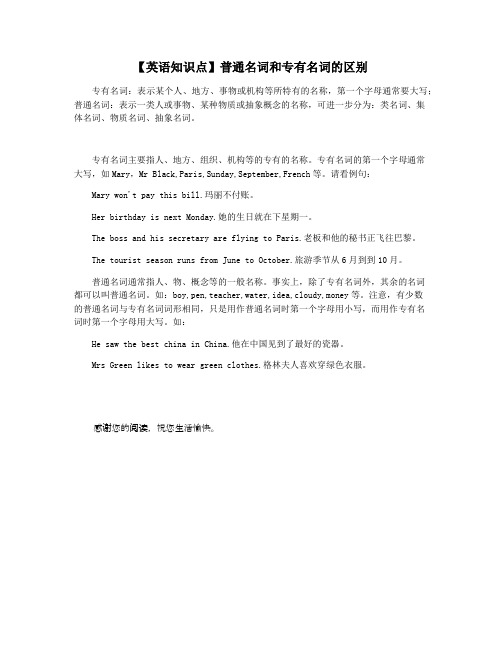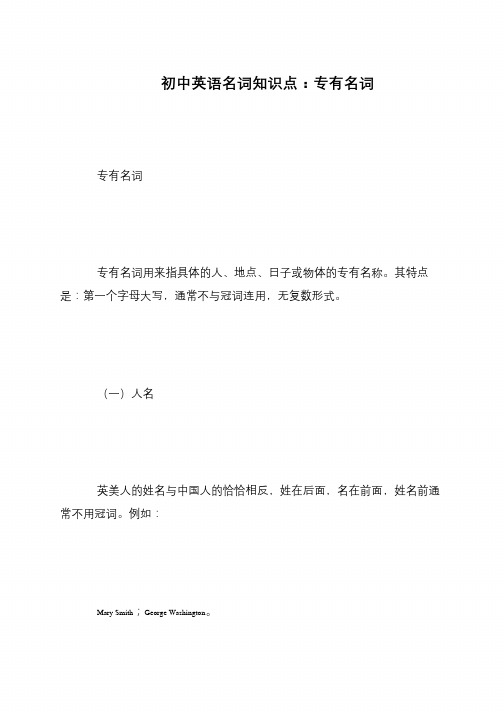2020年中考英语名词知识点:专有名词
- 格式:doc
- 大小:24.00 KB
- 文档页数:2

中考英译语法知识点总结一、名词名词是指人、事物、地点或抽象概念的名称。
在英语中,名词可以分为普通名词和专有名词。
1. 普通名词普通名词指代一般的人、事物或概念,比如:book(书)、table(桌子)、friend(朋友)等。
普通名词在句子中可以作为主语、宾语或表语。
2. 专有名词专有名词是指特定的人、地点或事物的名称,通常以大写字母开头,比如:Jane(简)、Beijing(北京)、Coca-Cola(可口可乐)等。
专有名词在句子中通常作为特定的名称,不能加冠词。
名词的单数和复数形式在英语中,名词的单数和复数形式有规律可循。
通常情况下,名词加-s表示复数形式,但也有一些特殊情况需要注意。
比如:1. 以辅音字母+y结尾的名词,将y变为i,再加-es。
如:baby(宝宝)→babies(宝宝们)2. 以“s, x, ch, sh”结尾的名词,加-es表示复数形式。
如:bus(公共汽车)→buses(公共汽车)3. 以“f, fe”结尾的名词,将f, fe变为v,再加-es。
如:leaf(叶子)→leaves(叶子)二、代词代词是用来代替名词或名词短语的词语,能够以较为简洁地方式来表达信息。
英语中的代词有人称代词、物主代词、反身代词、指示代词和疑问代词等。
1. 人称代词人称代词用来指代说话者、听话者或句子中的其他人、事物。
英语中的人称代词包括:I (我)、you(你)、he/she/it(他/她/它)等。
2. 物主代词物主代词用来指示所属关系,表达所有关系。
英语中的物主代词包括:my(我的)、your(你的)、his/her/its(他的/她的/它的)等。
3. 反身代词反身代词用来指示动作的主语和宾语是同一个人或事物。
英语中的反身代词包括:myself (我自己)、yourself(你自己)、himself/herself/itself(他自己/她自己/它自己)等。
4. 指示代词指示代词用来指示人或事物的位置或距离。

【英语知识点】普通名词和专有名词的区别
专有名词:表示某个人、地方、事物或机构等所特有的名称,第一个字母通常要大写;普通名词:表示一类人或事物、某种物质或抽象概念的名称,可进一步分为:类名词、集
体名词、物质名词、抽象名词。
专有名词主要指人、地方、组织、机构等的专有的名称。
专有名词的第一个字母通常
大写,如Mary,Mr Black,Paris,Sunday,September,French等。
请看例句:
Mary won't pay this bill.玛丽不付账。
Her birthday is next Monday.她的生日就在下星期一。
The boss and his secretary are flying to Paris.老板和他的秘书正飞往巴黎。
The tourist season runs from June to October.旅游季节从6月到到10月。
普通名词通常指人、物、概念等的一般名称。
事实上,除了专有名词外,其余的名词
都可以叫普通名词。
如:boy,pen,teacher,water,idea,cloudy,money等。
注意,有少数
的普通名词与专有名词词形相同,只是用作普通名词时第一个字母用小写,而用作专有名
词时第一个字母用大写。
如:
He saw the best china in China.他在中国见到了最好的瓷器。
Mrs Green likes to wear green clothes.格林夫人喜欢穿绿色衣服。
感谢您的阅读,祝您生活愉快。

初中英语语法重点汇总Ⅰ. 词法一、名词1、名词的种类❖专有名词❖普通名词✓可数名词个体名词、集体名词✓不可数名词物质名词、抽象名词2、名词的数❖可数名词的数✓单数✓复数➢规则变化●一般情况下词尾-s●以-s、-x、-ch、-sh等结尾的名词词尾-es●以辅音字母-y结尾的词,变y为i,-es●以元音字母-y结尾的词,直接词尾-s●以-f/-fe结尾的词,变f/fe为v,-es●以-o结尾的词,-s或-es➢不规则变化●单词中元音字母发生变化,如man-men,foot,feet●单数复数同形,如sheep-sheep,Chinese-Chinese●复合名词,只变主体名词部分,如boyfriend-boyfriends●其他,如child-children➢特殊情况●只用复数的名词●以-s结尾但并不是复数的名词●集体名词既可以复数,也可以单数●其他❖不可数名词的数✓不可数名词没有复数形式✓有些不可数名词表示具体事物时可数,但意义不同,如chicken,paper3、名词的计量❖可数名词的计量❖不可数名词的计量4、名词所有格❖-’s所有格❖of+名词所有格❖of+-’s 双重所有格❖被名词所有格修饰的名词的省略5、名词在句子中的作用作主语作表语作宾语作宾语补足语作定语作状语作同位语作称呼语二、代词1、人称代词2、物主代词3、反身代词4、相互代词有each other和one another等5、指示代词❖单数:this,that❖复数:these,those6、不定代词❖some和any❖many和much❖both和all❖neither和none❖either、each和every❖another、other(s)和the other(s)✓for another two weeks = for two more weeks ✓some...others...✓one...the other...✓the others = the other +复数❖(a) few和(a) little❖one(s)❖复合不定代词:some-,any-,no-,every-❖复数:these,those7、疑问代词❖指人✓主格:who✓宾格:whom✓所有格:whose❖指物what❖指人或物which8、连接代词who,whom,whose,what,which,whoever,whatever,whichever 9、关系代词who,whom,whose,what,which三、数词1、常见表达法❖日期与时刻✓日期某月某年、某月某日、“月日,年”或“日月,年”✓时刻直接读数表示、用past或to表示❖年龄和年代✓年龄基数词✓年代in the+带有整十的年份的复数或-’s形式❖货币符号+基数词❖编号名词+基数词、the+序数词+名词❖ 小数分数百分数✓ 小数 如three point nine o/zero seven (3.907) ✓ 分数➢ 分子用基数词,分母用序数词,分子大于1时分母序数词后加-s ,如:one third (31),two fifths (52)➢ 分子是2时,常用half ;分子是4时,常用quarter➢ 带分数用“基数词+and+分数”,如:one and two fifths (521)❖ 倍数✓ 倍数+比较级+ than ✓ 倍数+ as +原级+ as ✓ 倍数+ as many/much...+ as...✓ 倍数+ the size/weight/height/length/age...+of... ❖ 约数✓ 大约 about ,nearly ,almost ,some ,around 等 ✓ 超过 over 或more than ✓ 少于 less than ✓ 左右 or so ❖ 算式“+” 用plus 或and ;“-”用minus ;“×”用times 或multiplied by ;“÷”用divided by 2、数词的句法功能❖ 作主语 Twenty of them are from Chonqing. ❖ 作宾语 I like the third best. ❖ 作表语 He is twelve.❖ 作定语 Tom is the tallest of the three boys. ❖ 作状语 Where did you first meet him?❖作同位语We two will help you.3、数词的构成和用法❖基数词✓100以内基数词✓100以上基数词❖序数词✓1~3,4~19✓20~90整十位数✓21以上✓一百、一千、一百万四、介词1、介词的分类简单介词、合成介词、双重介词、短语介词2、介词的位置常规位置、其他位置3、介词短语❖构成介+名,介+代,介+数,介+动名,介+疑问词+不定式,介+从句❖作用作定语、作状语、作表语、作宾语补足语4、介词固定搭配介词与名词、介词与动词、介词与形容词、介词与副词、介词与过去分词5、常见介词用法❖表示时间✓at,in,on✓since,for✓after,in✓by,until/til✓before,after✓from✓during❖表示地点、方位✓at,in,on,to✓on,over,above,under,below✓beside,by,near,nearby,next to,around ✓inside,outside✓into,onto,out of,off✓across,through,past,over,along,down ❖表示方式手段工具✓in,on,by✓in,by,with❖其他✓on,about✓except,except for,besides ✓between,among✓of✓like ✓with✓without ✓for✓as✓against五、冠词1、冠词的用法❖定冠词✓特指的✓谈话双方都知道的✓上文提到的✓独一无二的❖不定冠词✓一类中的任意一个✓第一次谈到✓一类人或物✓数量“一”✓每一,相当于every❖不用冠词✓已有定语✓不可数或复数表一类✓三餐、球类、学科2、冠词的位置❖定冠词❖不定冠词3、有无冠词的区别❖go to school 去上学/ go to the school 到学校去(不一定是学生)❖on earth 究竟/ on the earth 在地球上❖next year 明年/ the next year 第二年❖at table 在吃饭/ at the table 在桌子旁边❖by sea 乘船/ by the sea 在海边❖in bed(睡、病、躺)在床上/ in the bed (某物)在床上❖in class 在上课/ in the class 在班上❖in front of 在(……外部的)前面/ in the front of 在(……内部的)前面六、连词1、按形式简单连词、关联连词、短语连词2、按功能❖并列连词✓表并列and,both...and...,neither...nor...,not only...but also...,as well as✓表转折but,while,yet✓表选择either...or...,or✓表因果so,for❖从属连词✓引导名词性从句主语从句、宾语从句、表语从句、同位语从句✓引导状语从句时间状语、条件状语、原因状语、目的状语、让步状语、结果状语、地点状语、比较状语、方式状语七、副词1、副词的种类时间、地点、频度、方式、程度、疑问、关系、连接、其他2、副词的构成形容词+-ly,与形容词同形3、副词的句法功能作状语、作定语、作表语、作补足语4、副词在句中的位置时间地点、频度、方式、程度、疑问、关系和连接、地点、修饰句子5、副词的比较等级❖构成✓规则✓不规则❖用法6、副词与形容词比较作用不同、句中位置不同、谓语动词7、常见易混副词辨析❖too,either,also,as well ❖already,yet❖ago,before❖hard,hardly❖late,lately❖very,much,very much ❖too,very,quite❖just,just now❖such,so ❖nearly,almost❖fast,quickly,soon❖too much,much too❖how long,how often,how soon ❖farther,further❖sometimes,sometime❖no,not❖maybe,perhaps❖high,highly八、形容词1、形容词的种类性质形容词、叙述形容词2、形容词的构成❖本身就是形容词❖名词+后缀-y,-ful,-less,-ern,-ly,-n❖复合形容词数词+名词、形容词+名词-ed、形容词+动词-ing、名词+动词-ed、副词+动词-ed3、形容词的句法功能作定语、作表语、作宾语补足语、作状语、作主语或宾语4、形容词的位置❖前置或后置❖排序限定词+数量词+描绘性形容词(大小长短形状新旧颜色)+出处+材料+类别用途+名词5、形容词的比较等级❖构成✓规则变化➢long-longer-longest➢nice-nicer-nicest➢big-bigger-biggest➢easy-easier-easiest➢beautiful-more beautiful-most beautiful✓不规则变化➢good/well-better-best➢bad/ill-worse-worst➢little-less-least➢many/much-more-most➢far-farther/further-farthest/furthest➢old-older/elder-oldest/eldest❖用法✓同级比较、同级比较特殊用法✓比较级、比较级特殊用法✓最高级、最高级特殊用法6、含有形容词的固定短语和句型❖固定短语at,about,for,in,of,to,with ❖常用句子✓It’s + adj. + of sb. to do sth.✓It’s + adj + for sb. to do sth.✓sb. be + adj. + to do sth.7、常见易混形容词辨析❖good,fine,nice,well ❖alone,lonely❖interesting,interested ❖exciting,excited ❖ill,sick❖true,real❖huge,large,big,great ❖pleased,pleasant❖elder,older❖farther,further九、动词1、动词的基本形式动词原形、一般现在时第三人称单数、现在分词、过去分词、过去式2、动词的种类❖行为动词及物动词、不及物动词❖连系动词后跟表语❖助动词无意义,语法需要。

英语语法大全之——名词名词的定义:名词是用来表示人、事物、地点以及抽象事物的名称的(A noun is the name of a person or thing)。
一、英语名词可分专有名词和普通名词两大类:1、专有名词是个别的人、地、物、团体、机构等的专用名称。
专有名词中实词的第一个字母要大写。
如:Beijing, Tom, the People ’s Republic of China(中华人民共和国 )专有名词如果是含有普通名词的短语,则必须使用定冠词the。
如:the Great Wall(长城)姓氏名如果采用复数形式 ,则表示该姓氏一家人 (复数含义 ),如:the Greens( 格林一家人 )。
2、普通名词是许多人或事物的共有名称。
如:pupil, family, man, foot.普通名词又分为可数名词和不可数名词。
▲可数名词是可以用简单的数词进行计数的名词,如:box, child, orange;▲不可数名词是不可以用简单的数词进行计数的名词。
如:water, news, oil, population,information .二、英语可数名词的单复数:英语可数名词有单数和复数两种形式。
1、名词由单数变复数的基本方法如下:①在单数名词词尾加s。
如:map—mapsboy—boyshorse—horses table—tablesbook—books dog—dogs pen—pens以清辅音结尾的名词后的S的读音为|S| ,以浊辅音和元音结尾的名词后的S读音为|Z|②s,o,x ,sh,ch结尾的词加es. (es读音为|iz|)如:class—classes box—boxes hero—heroes dish—dishes bench—benchesbus—buses brush—brushes[注]:少数以元音字母o 结尾的名词 ,变复数时直接在词尾 +s。
如:photo—photos piano—pianos radio—radios(但Negro、hero、potato、tomato、mango、mosquito均+es,其他+s) 黑人、英雄、土豆、西红柿、芒果、蚊子③以辅音字母 +y 结尾的名词 ,变y 为i,再加 es。


考点一名词命题趋势:名词属于十大词类中的一种,主要包括普通名词和专有名词两种。
纵观近几年中考对于名词的考查,主要以选择题和填空题为主,考查内容以词义理解、名词所有格及词形转换居多。
在备考2020年中考时,注意掌握名词变复数的变化规则,掌握不可数名词向可数名词转化的规律,名词所有格的用法,名词的句法功能等,并做到灵活运用,以便提高综合运用能力。
中考考查重点:一、名词词义辨析;二、名词的数;三、名词所有格。
考向一:名词的分类【知识拓展】集体名词的分类1. 本身是复数,如,cattle牛群,people人们,police警察。
2. 本身单复数均可表示,如audience观众,class班级,club俱乐部,committee委员会,company公司,crew船员,enemy敌人,family家庭,government政府,group组,team队(当这一类词作主语时,谓语动词的单复数形式取决于其表示的具体含义,如果作为一个整体看待时,谓语动词用单数形式;如果指的是具体成员,则谓语动词用复数形式)►The family is the basic unit of society. 家庭是构成社会的基本单位。
►My family are going on a trip this summer. 我们全家今年夏天要外出旅游。
(2020四川广元中考) Sandy really likes eating meat, but she doesn’t like eating .A. breadsB. vegetablesC. chickens【答案】B【解析】考查名词的数。
句意:桑迪确实很喜欢吃肉,但她不喜欢吃蔬菜。
选项中的bread为不可数名词,无单复数形式的变化,可排除;chicken作不可数名词时意为“鸡肉”,无单复数形式的变化。
作可数名词时意为“小鸡”,不符合语境,可排除;vegetable意为“蔬菜”,为可数名词。
英语初中知识点专着名词对于学生来说,记语法是个非常难的差事,每个单元多则六、七个语法,少的也五、六个语法,记忆起来特别困难。
关键是大部分的学生对于语法的使用都掌控不好。
下面是作者给大家带来的英语初中知识点专着名词,欢迎大家浏览参考,我们一起来看看吧!初中英语知识点:专着名词专着名词:是特定的某人、地方或机构的名称,即:人名,地名,国家名,单位名,组织名,等等。
例如:人名:Tom,Peter,Mr Yang地名:Europe,New York,People‘s Square节日、月份、星期:Christmas,February,Saturday专着名词的第一个字母必须大写。
注意:有些单词字母的大小写不同,词义也不一样。
如:Rose 罗斯(姓名)——rose玫瑰花China 中国——china 陶瓷或中国(不特指)普通名词表示一类人或东西或是一个抽象概念的名称,如: worker, camera, steel等。
专着名词的第一个字母必须大写。
例如:Hemingway海明威 Russia 俄罗斯 New York 纽约 United Nations 联合国再如:Hong Kong, China, Bill Clinton英语中根据专着名词前是否带冠词可分为两类:一类是零冠词,如Yale University, Beijing Railway station,是由专着名词+普通名词组成,常常为并列关系。
另一类属于带冠词,如The United States,The Great Wall,由形容词+普通名词组成单复数同形:Chinese,Japanese单复数不同形:German—Germans,American—Americans其中,若专着名词复数与定冠词连用,表示“某某夫妇”或“某某一家”,作主语时,谓语动词用复数。
初三英语专着名词知识点(一)人名英美人的姓名与中国人的恰恰相反,姓在后面,名在前面,姓名前通常不用冠词。
2020年中考英语名词知识点:名词定义
名词名词 (Nouns)是词性的一种,也是实词的一种,是指待人、物、事、时、地、情感、概念等实体或抽象事物的词。
名词能够独立
成句。
在短语或句子中通常能够用代词来替代。
名词能够分为专有名
词和普通名词。
1. 专有名词:指表示人、地方、机构、组织等的专有名称。
具体
说来,它包括人名、地名、月份、星期、节日、书名、电影名以及某
些抽象名词等。
如:
Jim 吉姆 China 中国 Mr. Smith 史密斯先生
July 七月 Friday 星期五 the Yellow River 黄河
Christmas 圣诞节 English 英语 A Tale of Two Cities 《双城记》
注:专有名词的首字母通常要大写。
若是专名名词词组,则其中
每个单词的首字母要大写;若是缩略词,则通常每个字母都大写;称呼
家人的 mum, dad, father, mother 等有时也可小写。
2. 普通名词:指表示一类人或东西或抽象概念的名词。
具体地说,它可分为个体名词、集合名词、物质名词和抽象名词。
其中个体名词
表示某类人或东西中的个体,如 girl(女孩)等;集体名词表示若干个
个体组成的集合体,如 audience(观众,听众)等;物质名词表示无法
分为个体的实物,如water(水)等;抽象名词表示动作、状态、品质、
感情等抽象概念,如 work(工作),happiness(幸福)等。
2017年中考英语名词知识点:专有名词
专有名词
专有名词用来指具体的人、地点、日子或物体的专有名称。
其特点是:第一个字母大写,通常不与冠词连用,无复数形式。
(一)人名
英美人的姓名与中国人的恰恰相反,姓在后面,名在前面,姓名前通常不用冠词。
例如:
Mary Smith;George Washington。
(1)一般熟人间通常用名称呼。
例如:
How's John getting on? 约翰近来好吗?
(2)在不熟悉人之间或表示礼貌时,常把姓和称谓连用。
例如:
Would you please tell John Smith to come to the office? 请你告诉约翰·史密斯到办公室来一次好吗?
(3)姓氏复数前加定冠词可表示全家人。
例如:
The Turners have gone to America.特纳一家人去美国了。
(二)地名
(1)大部分单数形式的地名不用定冠词。
例如:
Asia;America;China; London;Shanghai
(2)大部分单数形式的湖、岛、山名前不加定冠词。
例如:.
Silver Lake;Mount Tai
(3)山脉、群岛、海洋、河流、运河、海湾、海峡、半岛、沙漠名前一般加定冠词。
例如:
the Pacific;the English Channel;the Sahara
(三)日期名
(1)节日名前通常不用冠词。
例如: Christmas;National Day
(2)星期名前通常不用冠词。
例如: Sunday;Tuesday
(3)月份名前通常不用冠词。
例如: April;December
【2017年中考英语名词知识点:专有名词】。